Grounding issues are most common in electric fences. A ground wire doesn’t carry current all the time.
A fence charger outputs a very short-timed voltage pulse. When someone touches the fence, current leaks into the ground through the animal/human body.
Very little current escapes into the ground and reaches back to the fence, ground rods, and energizer.
When a little current reaches back to the ground wires only after someone touches the fence, then why is the ground wires hot in your electric fence?
We’ll discuss electric fence grounding in details.
Why is the ground wire hot on my electric fence?
Circuit issues that make your electric fence hotter:
- A loose connection between grounding(rods/wires/energizer) increases resistance. The current won’t return to the energizer and stays in the ground, making it hotter.
- You have used thin wires for grounding the electric fence. When a wire conducts current more than its capacity, it gets hotter.
- Ground wires are shorted with a live wire, continuously receiving and passing current, hence overheating due to overcurrent.
In a finely working fence circuit, ground wires don’t carry current all the time; only when someone touches the fence and current leak into the ground.
Current escapes from live wire to the soil and reaches the ground rods. Through the ground wires, it travels to the energizer via the ground writing.
While if the ground wires in your fence are continuously hot, it indicates a problem.
1. Loose/broken ground connections:
A poor wiring connection between ground rods, wires, and the energizer’s ground terminal is one main reason for grounding faults and hotter ground wire.
A loose connection increases resistance in the circuit up to 500 ohms. Due to high resistance, current conductivity gets slow or completely stops. Thus current is stuck into the ground wires and rods.
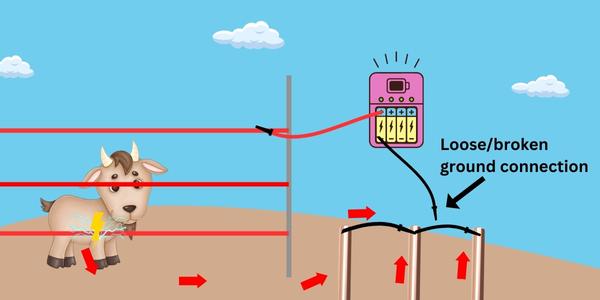
A ground wire in a fence or any circuit is safe to touch, as it usually doesn’t carry alot of current continuously.
While if there is an electrical error(loose wiring) in the grounding, the current cannot reach back to the energizer; hence stays in the ground wires and rods. Hence someone touching the ground wires will be severely shocked.
2. Short Circuits
If the fence ground wires get shorted(touch) with live fence wires or any live wires passing by, it’ll receive massive currents.
So the ground wire will have to carry the excess current, then its designed operation. Hence the ground wire will get hot due to the continuously passing current.
A short circuit in an electric fence could be risky for humans and animals due to the disturbed current path. The wires may burn due to getting extremely hot.
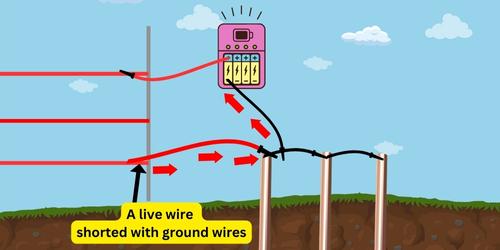
Also, if the ground wire is shorted with a live wire and is not connected to the energizer ground terminal, the current can’t complete the circuit, so it bounces back to the ground wire and makes it hot(live).
Hence, ensure that the ground wires are not loose and touching anything, i.e., earth surface, grass, or any conductor.
3. Thin/poor conductor wire used:
If you’ve installed a thin or poor conductive wire between the energizer and ground rods, it’ll get hot due to passing more current than the wire’s capacity(overload).
A thin and poor conductor wire has more resistance, which acts as a barrier against the current and results in poor/slow current conductivity.
So due to the thin conductor and higher resistance in the ground wire, current takes more time to travel(reach the energizer). Hence the ground wire gets hot due to slow conductivity and overuse.
In an ideal electric fence circuit, ground wires don’t carry current all the time, but only when someone touches the fence. So a ground wire should not be hot all the time.
That’s why an insulated, low gauge, excellent conductive wire, should be used for fence grounding.
A gauge is a unit for measuring the thickness of wires. A low gauge wire will be thicker and vice versa.
How to test electric fence grounding:
You can test your electric fence grounding using a voltmeter or a fence tester(that shows voltage). If there is constant voltage in the ground wires, it’s probably due to a live wire shorted with the ground wires.
Steps:
- Attach a metal rod/bar to the fence wires and ground, creating a short circuit.
- Now go back toward the ground rods.
- Turn on the fence tester, and insert the needle on the black probe into the ground.
- Attach the red probe needle to the ground rods(earth stakes), and the fence tester will indicate the voltage in the ground rods.
- The grounding circuit works fine if the reading is below 500 V(some experts recommend below 300V).
- While if the reading exceeds 500V, the grounding is insufficient, and your fence needs more ground rods.
Troubleshoot grounding issues in your fence
- Check the wiring connections between the ground rods and the fence energizer.
- Ensure that all earth stakes(rods) are securely connected, as a loose connection hinders current from flowing further in the circuit.
- The ground wire must be insulated to prevent anything(grass or a wire) from touching the conductor and losing fence power. More objects touching the ground wires will drain more charge, and very few charges(current) will reach back to the energizer, reducing your fence power.
Instruction for installing electric fence ground rods:
- Install at least 3 feet of ground rod per joule output of your fence charger. Example: If your charger outputs 6 joules, install 18 feet of metal rods underground.
- Each ground rod should be at least 6-8 feet long.
- Install each ground rod at least 10 feet apart from each.
- Ground wires should be thicker than fence wires. Use a ground rod clamp to tightly connect ground wires to the ground rods.
If the ground wire in your fence is hot, check all connections between ground rod wires and the fence energizer. If there is a weak joint, fix it.
Use a thicker, highly conductive insulated wire to connect ground parts(ground rods, energizer, ground terminal). A good conductor ensures better current conductivity.
How electric fence & grounding work:
In any circuit, current enters the live wire and returns through the neutral or ground wire.
There are two methods of installing an electric fence:
Type 1: All live strand electric fence
An electric fence charger inputs power from an AC or DC power source and has two output terminals; live and ground.
- The live wire carries current from the fence charger’s live terminal to the fence wires.
- All fence strands are live.
- Ground wires connect the energizer’s ground terminal to the ground rods.
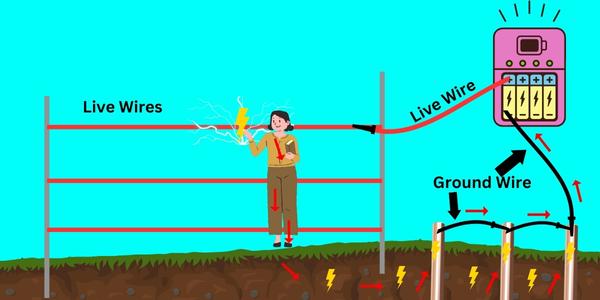
When someone touches the fence wires, current travels from his body and enters the soil. This free current travels toward the ground rods in the soil and is carried to the fence charger via the ground wire.
If the grounding works fine and you’ve used enough ground rods, more charges will be caught and delivered to the charger, increasing your fence power.
Type 2: For Dry Ground(Live-ground strand fence)
In dry/rocky conditions, fence rods(grounding) are insufficient. We connect one fence strand to the energizer’s live terminals and the second to the ground terminal.
This electric fence system works such that the live and ground wires are installed parallel. When someone touches both live and ground wires, the circuit gets completed, and they get shocked.
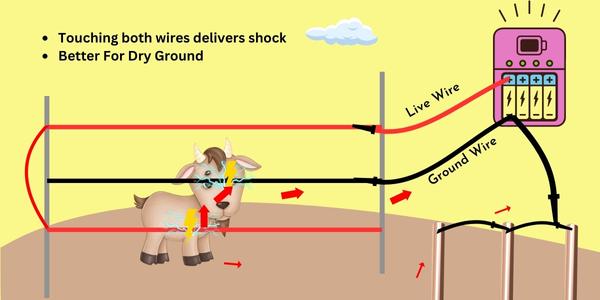
Current travels from the live fence wire to the ground wire through the human body and back to the charger.
Conclusion
A continuously heated ground wire in the fence will result in damaging wire insulation or causing a fire due to overheating.
If the ground wire is hot, it means that either excessive current is passing than usual.
Or the ground wire is thin(high gauge), rusted(worn out), and incapable of passing the current from ground rods to the energizer.
If the ground wire remains continuously hot, the insulation will melt, and the wire may get short-circuited.
That’s why using a thicker wire for grounding is better than your fence wires.
Still need any guidance, ask us in the comments.

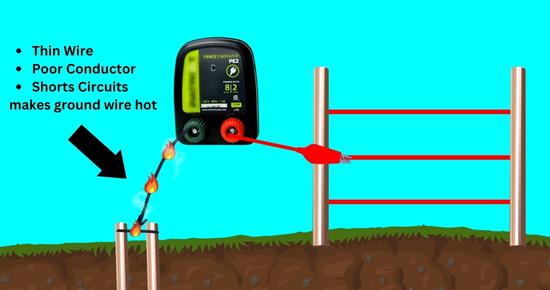
Hi I liked this post, it was quite informative & detailed. Keep on posting!